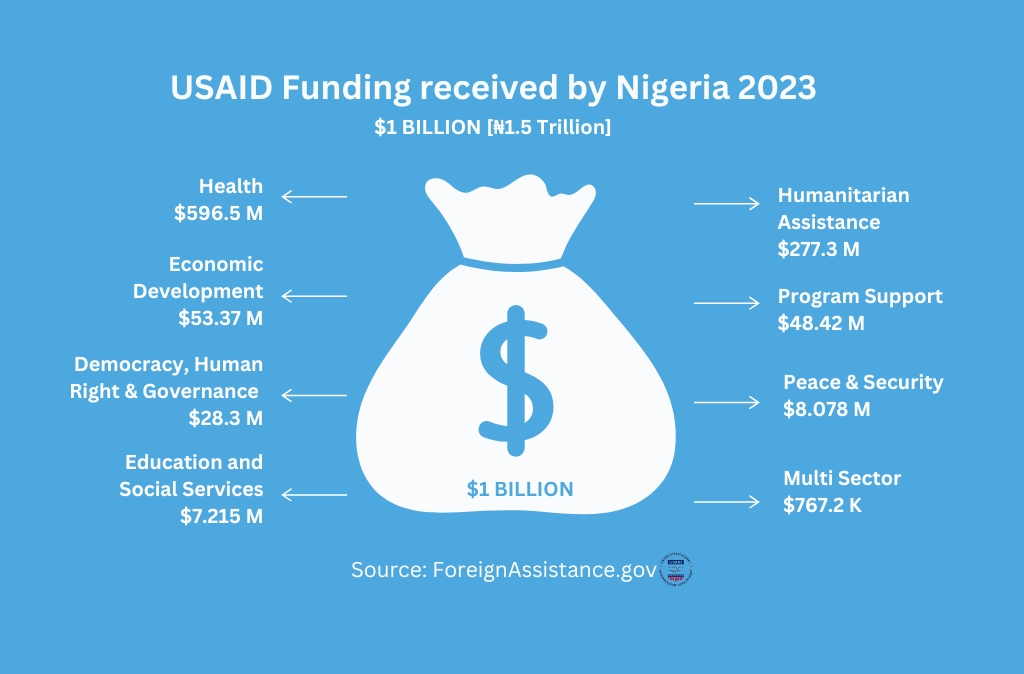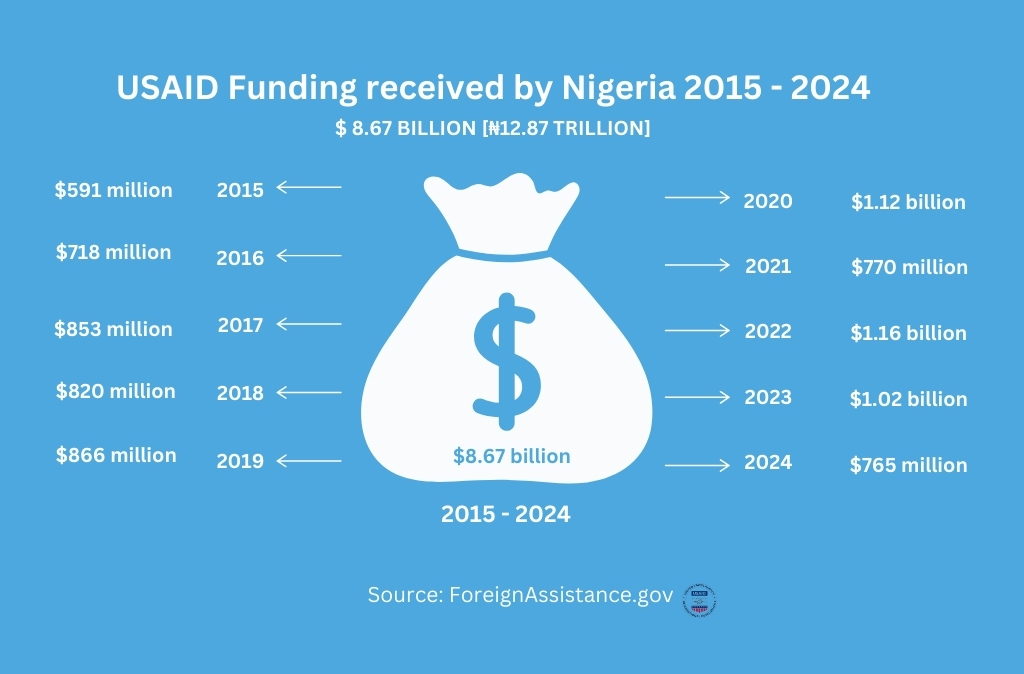Hundreds Stranded as US Aid Suspension Shuts Healthcare Centres in Nigeria’s Conflict Areas
The abrupt suspension of US foreign aid has left several vulnerable persons in Nigeria’s conflict areas without healthcare, food, and livelihoods. With no immediate alternatives, the crisis deepens.

In Konduga, a rural community in Borno, northeastern Nigeria, a healthcare facility run by Family Health International (FHI360) previously treated over 200 patients daily, offering medical assistance and nutritional supplements for malnourished children. Now, its doors are shut.
Yana Modu, who had relied on the clinic for therapeutic feeding and medicine for her three-year-old, arrived last week expecting the usual routine. Instead, she was met with a blunt response from a security guard: “Zakkata”—it is closed.
“I was told they are not opening again,” she said. “How can I get drugs and also feed my baby?”
Yana’s visit to the clinic came seven days after President Donald Trump signed an executive order suspending all US foreign assistance for 90 days starting Jan. 20. In Nigeria, where several residents rely on US-funded programmes for survival, the abrupt decision has deepened uncertainty for vulnerable communities.
Borno State, one of the hardest-hit areas, has long been plagued by decades of conflict, leaving millions dependent on humanitarian aid. Now, primary healthcare centres and nutrition clinics like the one in Konduga, which once offered life-saving maternal and child health services, are shutting down, leaving many without vital support.
“The people we see daily have nowhere to go apart from the NGO-funded facilities,” Amina Yusuf, a nutritionist in Konduga who worked at one of the facilities for over three years, told HumAngle. “Without these services, the risk for them is severe. Many now have no options, and complications during childbirth could become fatal.”
The US has long been Nigeria’s largest bilateral donor, providing approximately $9.27 billion in aid over the past decade. Annual inflows have ranged between hundreds of millions and over a billion dollars, with the highest amount recorded in 2022 at approximately $1.16 billion. This funding, primarily channelled through USAID and other US government agencies, has supported security assistance, humanitarian relief, health interventions, education, and economic development in the country.

However, with US aid suspended, critical services that sustain Nigeria’s most vulnerable populations are in jeopardy. The executive order, issued without prior warning, has immediately halted several key humanitarian programmes, including funding for healthcare, food aid, education, and emergency response efforts. Although the Trump administration later granted a waiver for ‘life-saving humanitarian assistance,’ several international and local non-governmental organisations (NGOs) had already begun laying off staff and shutting down vital programmes.
In Bama, a laid-off humanitarian worker who requested anonymity said staff were abruptly informed on Monday, Jan. 27, that their project had lost funding. “Moments later, we were handed official letters informing us that operations were being scaled down indefinitely,” the worker told HumAngle.
Another aid worker with a local NGO in Bama said 20 employees were laid off. This was their only source of income for many, and the abrupt suspension left them unsure of what to do next.

A growing humanitarian crises
The suspension of US aid has far-reaching consequences beyond healthcare and job security. Food assistance programmes face disruption, worsening the already fragile conditions in the country’s conflict zones.
Maina Musa, an ophthalmologist, nutrition officer, and humanitarian expert, warned of a dire impact on various sectors. “There is a significant impact on those already vulnerable and reliant on such assistance. The disruption of essential services will severely affect states like Borno,” he told HumAngle. “Shortages in medical supplies and staff will create critical gaps in maternal care and the treatment of chronic diseases.”
Musa added that hunger and malnutrition could spiral out of control, especially in communities already grappling with food insecurity. “We have many vulnerable groups: children, the elderly, and women. With increasing tensions from job losses and the lack of aid, these groups will suffer the most,” he added.
Across affected regions, aid suspensions are fuelling uncertainty. Many fear that without alternative funding, Nigeria could see worsening hunger, disease outbreaks, and even an increase in recruitment into terror groups, as economic desperation grows.
“Most aid does not address the root causes of problems, and its suspension will likely exacerbate the situation,” Musa added.
Beyond Borno
While Borno remains the epicentre of the crisis, several other conflict-ridden regions in Nigeria rely heavily on humanitarian assistance. States such as Yobe, Adamawa, Zamfara, Katsina, Niger, and Benue, where persistent insecurity has displaced thousands, are particularly vulnerable. Many displaced communities, originally dependent on farming, have been forced into urban slums or IDP camps due to insurgency, banditry, and farmer-herder clashes.
In northwestern Nigeria, Zamfara and Katsina states have seen an increase in attacks by armed groups, making farming nearly impossible. Food shortages and malnutrition rates are rising. Similarly, the Middle Belt, particularly Benue and Plateau states, continues to experience violent clashes, displacing thousands and crippling local food production.
“The competition for dwindling resources will intensify,” Musa said.
Can alternative funding fill the gap?
In 2024, the US accounted for more than 40% of global aid funding. Its sudden withdrawal has left international organisations scrambling for solutions. “If alternative funding is not secured soon, these communities will experience worsening hunger, disease outbreaks, and extended displacement,” said Zannah Mustapha, a peace dialogue and mediation expert.
While other major donors, including the European Union (EU), the United Kingdom (UK), and the United Nations (UN), continue to provide substantial humanitarian aid, their contributions remain insufficient to fill the gap left by the US suspension. Last year, EU allocated €181 million ($195 million) in aid to Nigeria, while the UK provided approximately £100 million ($127 million).
Recognising the growing crisis, the UN recently launched a $910 million appeal to assist 3.6 million people in northeastern Nigeria. However, these efforts still do not match the scale of US support. In response to the potential impact on millions of people living with HIV/AIDS, the Nigerian government has approved nearly ₦5 billion for the procurement of treatment packs to ensure continued access to care.
If the aid suspension extends beyond the initial 90-day period, the humanitarian situation in Nigeria could deteriorate further. Healthcare systems, already stretched thin by years of conflict, could collapse. The absence of aid-driven livelihood programmes may leave thousands with no means of survival, increasing the risk of radicalisation and insecurity.
The coming months will determine whether international and domestic stakeholders can step in to prevent a deepening crisis—or whether the country’s poorest communities will suffer the consequences of geopolitics beyond their control.
The sudden suspension of US aid to Nigeria has significantly impacted healthcare and humanitarian services, especially in conflict-affected areas like Borno State.
Facilities such as those in Konduga that offered medical and nutritional support to hundreds daily have closed, leaving vulnerable populations without essential care. U.S. aid, having provided billions over the past decade, was a critical source of funding for numerous programs.
The abrupt withdrawal is straining services, risking increased malnutrition, disease, and insecurity amidst ongoing conflict.
The halting of aid, despite the later provision of a waiver for 'life-saving assistance,' has led to layoffs and the scaling down of operations by numerous NGOs. This has exacerbated challenges in providing adequate healthcare and addressing food insecurity in regions that are already struggling with displacement and violence.
While alternative funding from EU, UK, and UN efforts offers some relief, it remains insufficient compared to prior U.S. contributions, posing a risk of worsening humanitarian conditions unless addressed promptly.
Support Our Journalism
There are millions of ordinary people affected by conflict in Africa whose stories are missing in the mainstream media. HumAngle is determined to tell those challenging and under-reported stories, hoping that the people impacted by these conflicts will find the safety and security they deserve.
To ensure that we continue to provide public service coverage, we have a small favour to ask you. We want you to be part of our journalistic endeavour by contributing a token to us.
Your donation will further promote a robust, free, and independent media.
Donate HereStay Closer To The Stories That Matter




